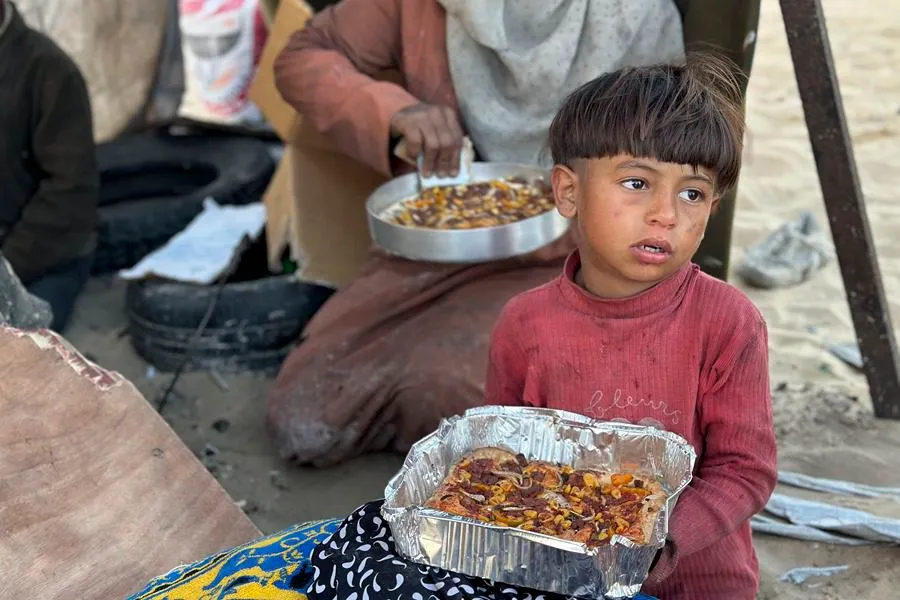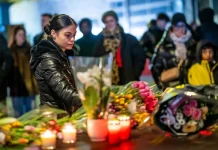The inhabitants of Gaza resign themselves to suffering a broken Ramadan, without celebrations to break the fast, without food on the tables, without family or friend gatherings; while they remember the times that the Israeli Army has stolen from them and put their destiny in the hands of God, aware that man has abandoned them.
“From the first day of Ramadan you saw people in the streets as if it were a holiday. There were visits every day, meetings at the homes of your neighbors and acquaintances. Visits in Ramadan are one of the best traditions,” recalls Ali Ahmad Asfur in a desolate environment of plastic tents, in one of the dozens of camps in which 1.4 million displaced people are crowded in Rafah.
Going back to a Gaza that no longer exists, Asfur, 50, says with nostalgia that the Strip was the only place in the world – according to him – where people “felt Ramadan” and celebrated it all month long, with a mix of recollection and celebration, with the houses decorated for the occasion and new clothes bought.
“We prepared special food for ‘suhur’ (last meal before daytime fasting) and ‘iftar’ (meal that breaks the fast after sunset), the table was full of sweets and ‘kanafe’,” he tells EFE. with a half smile Mohamed Barakat, another displaced person who fled Khan Yunis after the outbreak of war on October 7.
No celebrations
“But that is the past, traditions that will not return, because for about 20 days we have been drinking bitter tea because there is no sugar at all and, if there was, a kilo costs 25 dollars,” adds Mohamed, a 45-year-old man who regrets that this year she has not even been able to buy shoes for her barefoot children.
While an ambulance is heard and the daily hum of an Israeli drone, Mohamed, who is wearing a blue sweater torn at the neck and one shoulder, says that before the party he spent a whole day looking for shoes in vain.
Next to his store, he comments that Ramadan is welcome from a religious perspective, but there is no desire to celebrate: “there is no special plate of food, under the shadow of death.”
“This Ramadan is different, everything has changed in the Gaza Strip, there are only dead human beings or those who await death as their destiny,” he says sadly.
For the children
Asfur points to the surrounding tents and relates: “That family has martyrs, that tent has a martyr, in the next tent his wife is missing. I have 19 martyrs.” “How am I going to bring Ramadan decorations even for the children? I can’t, it would be a shame”, he asks himself and answers himself.
However, Amer, a 42-year-old seamstress, does not plan to give up the festive nature of Ramadan, even if it is for his children. Around his tent he has tied several ropes with red and blue papers, imitating the decorations that adorned the city before the war.
On a cardboard it reads: “A Ramadan under the bombs. Arabs, Muslims: Ramadan Karim!” (Generous Ramadan, an expression with which these holidays are congratulated.)
“We do not know what to do. This soup is made with canned food, but the atmosphere of Ramadan and the decoration is for our children,” he tells EFE, sitting in front of the bonfire where he heats the soup to break the fast.
Hopeless
The arrival of the lunar month of Ramadan, sacred for Muslims and which began yesterday, has shown Israel’s implacable determination to continue with an offensive that has already left more than 31,100 dead and the inability of the international community to impose a truce.
“We want a ceasefire and an end to the war, people can’t take it anymore. Diseases and epidemics have spread, we do not even have the basic needs to live,” Mohamed emphasizes.
For Mohamed, “the world is oppressive and has no mercy for the weak,” since the war has shown that “no one cares about the fate of the Gazans and the world only cares about their interests.”
“The ones who pay the bill for this war are we, the people of the Gaza Strip.”

However, Asfur does not lose hope that the people of the world “speak, either in the Security Council or in the International Court in The Hague, and that the war will end.”
“Everything is broken this Ramadan,” says Mahmud Zohro, 26, from inside his plastic tent, surrounded by clothes and belongings.
“In every house there is something broken, in all of them there is sadness and destruction. My brother and his son have died, I have lost a friend, two uncles… there is no one left. (…) It is the most horrible war we have ever been through,” she says, while he holds the useless key to his house that he abandoned in Khan Yunis fleeing death. “It’s nothing more than a pile of rubble.”
BY: AP








